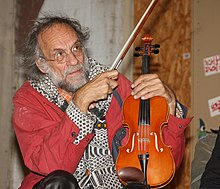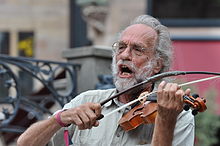Klaus the violinist
Klaus the Geiger (born January 20, 1940 in Dippoldiswalde as Klaus Christian von Wrochem ) is a politically committed musician and songwriter in the left-wing alternative spectrum of the New Social Movements . He is considered one of the most famous street musicians in Germany.
Life
Von Wrochem , who comes from a middle-class family, began studying the violin with Max Rostal at the Musikhochschule in Cologne in 1960 . At that time he was earning his living as an assistant violinist in various symphony orchestras and as an employee of the WDR . He also tried his hand at being a modern composer. Eight years later he was expelled from the university, but received a composer's scholarship to study in Buffalo and San Diego in the United States . There he studied with Pauline Oliveros “ Composition of the Avantgarde ” .
During his two-year stay abroad, von Wrochem also came into contact with the hippie movement . He married in 1965, returned to Germany in 1970 and moved into a commune . From then on he called himself Klaus the violinist in public .
Act

From the first protests, including with Wolfgang Niedecken, in Cologne's Südstadt district to maintain the closed Stollwerck chocolate factory as an alternative social meeting point, via the blockade of the access roads to the Pershing II silos on the Mutlanger Heide as part of the peace movement against the NATO double resolution , Klaus was and is the violinist to this day often heard on left-wing political demonstrations against environmental pollution , war , racism , government thinking and Castor transports, etc. Violin and dungarees are his trademarks. His music is a mixture of jazz , rock , folk and classical . He also tries to provoke with great clarity in his texts, which are often produced ad hoc on current occasions. He also appears from time to time in Cologne's pedestrian zones. Especially in the social movements and disputes in Cologne, Klaus the violinist is a constant. He is prominent nationwide, especially within the anarchist and grassroots movements .
As a violinist, he likes to use a self-made round arch in order to use "the violin as a harmony instrument" in street music . With the round arch, which he holds in his fist, he accompanies himself as a singer. He says about his playing style as a violinist that it is “pretty brutal” because: “I have a round arch and that's always very short and sweet, so I always hit it with the bow so rhythmically, so to speak. This is my way of playing. "
Von Wrochem campaigns for international understanding in his texts and actions. In 2000 he toured Belarus for a concert and street music tour with the Rukiwerch formation , consisting of Tom Fronza and Sascha Loss. The highlight was a spontaneous but illegal serenade in front of the palace of the Belarusian President Lukashenko ("Ice-cold Lukashenko, Lukashenko ice-cold ..."). As early as 1998, Klaus the violinist was invited to Japan by a group of young, socially committed people, where he and the group and local volunteers drew attention to the problems of the numerous homeless in Tokyo and other Japanese cities.
Klaus von Wrochem often takes part in concerts with various formations and is also active in music education. In addition to directing the orchestra of the art salon , he also gives lessons in improvisation. He also worked on projects in the area of crossover and chamber music , for example in Weimar as part of the celebrations for the European Capital of Culture in 1999.
In 2011 he received the "Ehren RUTH" (German World Music Prize) for his life's work at the TFF.Rudolstadt folk festival . The CD from all sides , released in 2011, received the German Record Critics' Prize in the same year.
Books
- Klaus the violinist and the Cologne street musicians: You, crown of creation ... Kölner Volksblatt, Cologne (no year)
- Klaus the violinist: Germany's most famous street musician tells a story. With a foreword by Günter Wallraff . Kiepenheuer and Witsch, Cologne 1996, ISBN 3-462-02512-0
- The street musician. Interview with Klaus von Wrochem , in: Ralf Noltensmeier: Violinist by profession. Conversational insights into the diversity of the violinist profession Götzelmann, Kiel 1999, ISBN 3-9805016-7-1
- Lust for anarchy too. An interview with Klaus the violinist. In: Bernd Drücke (Ed.): Yes! Anarchism. Living utopia in the 21st century, interviews and discussions. Karin Kramer Verlag, Berlin 2006, ISBN 3-87956-307-1 , p. 44 ff.
- Klaus the violinist: We all know paradise . With a foreword by Wolfgang Niedecken . Geistkirch-Verlag, Saarbrücken / Landau 2009, ISBN 978-3-938889-75-6
Discography
- 1972: We say yes to the SSK (self-published)
- 1973: Work makes you free (Bluff-records)
- 1975: Klaus and Toni (Trikont)
- 1978: From there (Trikont)
- 1979: It's war (Trikont)
- 1986: Mother Earth (Trikont)
- 1986: And the gentlemen have nothing like power (Good Year)
- 1988: No, no, we don't want your world (self-published)
- 1994: Klaus the violinist and the Cologne street musicians (mic music)
- 1996: Cologne Wailing Wall (Verlag Schmidt von Schwindt)
- 1997: Maximum Terzett (self-published)
- 1997: Rumpelstielz? , CD (Typoo)
- 1998: KdG (self-published)
- 2001: Ruki Werch (self-published)
- 2002: Now avver ran with the cabaret artist Jürgen Becker , (part of speech, ISBN 3-7857-1303-7 )
- 2002: KdG (2) self-published)
- 2003: Schlachtplatte (self-published)
- 2005: Who does not defend himself (self-published)
- Untitled: Three violinists among you (self-published), CDs and DVDs from 2007, 2008, 2009
- 2007: 10 years of the Cologne Art Salon Orchestra , CD and DVD (self-published)
- 2011: From All Sides , CD (Westpark (Indigo))
- 2016: Piadolla , CD (Westpark (Indigo))
Web links
- Internet presence of the musician
- Literature by and about Klaus the Geiger in the catalog of the German National Library
- Interview with Klaus the violinist
Individual evidence
- ↑ Cf. Günter Noll: Street music in Cologne. In: Günther Noll, Wilhelm Schepping (Hrsg.): Musical folk culture in the city of the present. Conference report Cologne 1988 of the commission for song, music and dance research in the German Society for Folklore eV (= Musical Folklore - Materials and Analyzes. Vol. X). Metzler, Hannover 1992, ISBN 3-8156-3358-3 , pp. 96-126.
- ↑ Gerhard Löhr: Songwriters in Germany: Poetry must win over politics (PDF), 2007, p. 159.
- ↑ Klaus the Geiger: We all know the paradise , Geiskirch-Verlag, Saarbrücken 3rd edition 2009, p. 136, ISBN 978-3-938889-75-6
- ↑ Jury statement (RUTH 2011)
| personal data | |
|---|---|
| SURNAME | Klaus the violinist |
| ALTERNATIVE NAMES | Wrochem, Klaus von |
| BRIEF DESCRIPTION | German songwriter and street musician |
| DATE OF BIRTH | January 20, 1940 |
| PLACE OF BIRTH | Dippoldiswalde |


